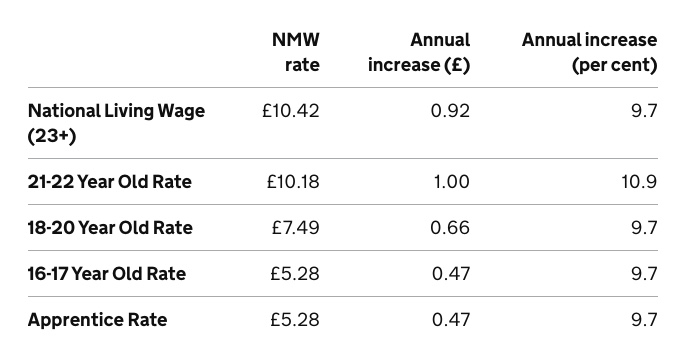National Living Wage increases to £10.42 an hour, benefiting 1.7m UK workers

Around 1.7 million workers in the United Kingdom are set to benefit from a 9.7% increase in the National Living Wage (NLW) to £10.42 an hour starting on 1st April.
According to the Resolution Foundation, the NLW has nearly doubled real pay growth for Britain’s lowest earners.
The 92p rise in the NLW, applicable to workers aged 23 and over, is the largest annual cash increase in the UK minimum wage’s 24-year history.
This increase comes at a time when inflation is expected to be around 7% in April, meaning the lowest-paid workers in the UK will enjoy a rare real-terms pay boost even as typical hourly pay rates continue to shrink in real terms.
Approximately 1.7 million workers earning up to 5p above the current minimum wage will directly benefit from the NLW increase, while potentially another five million low-paid workers will indirectly benefit from its ‘spillover’ effects as employers look to maintain differentials between pay bands.
New Resolution Foundation analysis highlights the transformative effect of the minimum wage since its introduction in April 1999.
Prior to the introduction of the National Minimum Wage (NMW), real hourly pay growth was strong but deeply unequal.

Since the introduction of the NMW, pay growth at the bottom has been about 50% stronger than at the top, and the introduction of the NLW has further strengthened this pattern.
The NMW and NLW have significantly reduced rising pay inequality, halving the incidence of hourly low pay from 22% of employees in 1998 to just 10.5% in 2022.
However, the policy has not had the same effect on weekly pay inequality, which has fallen by far less over the past 25 years.
This highlights the importance of hours worked, not just hourly rates, in determining living standards.
The Trades Union Congress (TUC) has warned that this weekend’s increase in the minimum wage will not “lift the pressure” on hard-pressed families.
The TUC found that minimum wage workers will lose out on £124 this year due to the new rate not rising in line with CPI inflation.
This loss increases to £712 if the RPI measure of inflation, which takes into account housing costs, is used.
TUC General Secretary Paul Nowak stated that the below-inflation increase to the minimum wage would not significantly alleviate the pressure on hard-pressed families, and called for increasing the minimum wage to £15 an hour as soon as possible.
He also urged the government to introduce sector-wide Fair Pay Agreements to improve pay and working conditions, and to ban zero-hours contracts to help stop the spread of low-paid insecure work.
Spotted something? Got a story? Send a Facebook Message | A direct message on Twitter | Email: [email protected]Latest News









